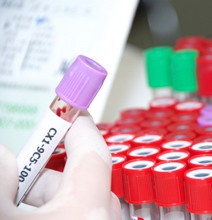High-risk men
Men from a family with a strong history of breast and/or ovarian cancer might discover that the disease is hereditary in their family.
There are genes that when altered (mutated), can increase the chances of hereditary (passed from generation to generation) breast cancer.
For both men and women, the most common genes linked with hereditary breast cancer are called BRCA (= BReast CAncer): BRCA1 and BRCA2.
- BRCA1 is located on chromosome 17, and BRCA2 on chromosome 13.
A hereditary mutation is one that is present at birth having been passed by the mother or father, depending of who carries the mutation.
The possibility of inheriting a mutated BRCA from an affected parent is 50%, meaning that the chance of inherit a diseased gene is the same as inheriting a normal one.
Both genes, but in particular BRCA2, are linked with breast cancer in men.
To have a strong family history of breast and/or ovarian cancer, or even carry a BRCA mutation, serves as an alert to the possibility of developing breast cancer.
However, it does not mean, that you will develop the disease.
The risk of breast cancer in men, even with this type of history, is still much lower than that of women.


